Monday, March 5, 2018
Medical Library holds symposium on the Necessity and Limitations of Right of Conscience in Healthcare Delivery
Mon, 05 Mar 2018Christopher Breedlove and Asa Keimig, LUCOM Marketing
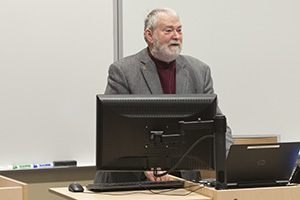 Liberty University College of Osteopathic Medicine (LUCOM) Medical Library hosted their annual Medical Bioethics Symposium this past Saturday, March 3, at the Center for Medical and Health Sciences on the campus of Liberty University. The theme of the symposium was The Necessity and Limitations of Right of Conscience in Healthcare Delivery. It was open to student-doctors, nursing students, law students, public health students, practicing physicians, medical professionals and physician assistants.
Liberty University College of Osteopathic Medicine (LUCOM) Medical Library hosted their annual Medical Bioethics Symposium this past Saturday, March 3, at the Center for Medical and Health Sciences on the campus of Liberty University. The theme of the symposium was The Necessity and Limitations of Right of Conscience in Healthcare Delivery. It was open to student-doctors, nursing students, law students, public health students, practicing physicians, medical professionals and physician assistants.
“The LUCOM Medical Library hosts this symposium annually with the intent of presenting the latest and most current situations in medical bioethics,” said Diane Garber, director of the Medical Library. “Our hope for those attending is that they will fully understand the background and history of the physician’s right of conscience within the country and how to navigate the changing climate in healthcare.”
According to Garber there has been widespread interest from faculty members and students at Liberty University’s School of Nursing, School of Divinity, School of Law, and School of Public Health, to present such a topic. “I believe Christian healthcare professionals are looking to LUCOM as a standard bearer and champion of Christian and Biblical ethics in medicine,” she added. “With legal and ethical issues constantly present in healthcare; Christian healthcare professionals need to be alert and aware of that reality in the United States.”
LUCOM Professor of Pharmacology Eugene Patterson, PhD, opened the event with a question, “What must I do as a Christian healthcare provider?” With a challenge to the students in attendance, he said, “There is a standard of behavior, be it legal or moral, and there is recognition of right and wrong. You have your personal conscience.”
Referencing the Osteopathic Oath that all DO student-doctors are expected to adhere to both as a student and one day a physician, Dr. Patterson reminded them that they are to preserve the health and the life of their patients. “You are to employ only recognized methods of treatment consistent with good judgment and with your skill and your ability. You are to always be mindful of nature’s laws and the body’s inherent capacity for recovery.”
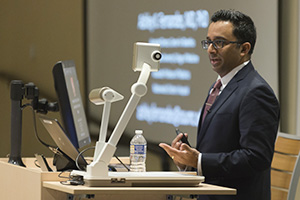 Invited keynote speaker, Ashley K. Fernandes, MD, PhD, FAAP, associate director of The Ohio State University Center for Bioethics and Medical Humanities, and associate professor of Pediatrics at Nationwide Children’s Hospital, officially started the presentations. With excitement, he commented that this was his first visit to Liberty University. “I am very appreciative to be here. You [student-doctors] are truly blessed to be here as Liberty maintains an identity during a time where the world has lost its completely.” Dr. Fernandes’ presentation was entitled Becoming Who We Ought to Be: Why Conscience Matters for Physicians and their Patients.
Invited keynote speaker, Ashley K. Fernandes, MD, PhD, FAAP, associate director of The Ohio State University Center for Bioethics and Medical Humanities, and associate professor of Pediatrics at Nationwide Children’s Hospital, officially started the presentations. With excitement, he commented that this was his first visit to Liberty University. “I am very appreciative to be here. You [student-doctors] are truly blessed to be here as Liberty maintains an identity during a time where the world has lost its completely.” Dr. Fernandes’ presentation was entitled Becoming Who We Ought to Be: Why Conscience Matters for Physicians and their Patients.
“There is no contradiction between faith and science; there cannot be. You [students] can do this and shouldn’t apologize for it [call to medicine]. Even if you are not a Christian, the Christian Worldview should not just be acceptable, it should be superior,” said Dr. Fernandes. “It offers patients something better. It is really important. Christians have something to offer and the culture can still be transformed. Have courage – don’t give up the battlefield.”
Addressing medicine, Dr. Fernandes illustrated a model that has become culturally expected. “Medicine has become first and foremost, a service for the good of the person and a person’s own conception of good (what they think is good). Then there’s the biomedical good, the good as a human ‘flourishing’, and way-down is spiritual good. In most medical schools, outside of Liberty, the only two things ever taught and learned is the first two. The bottom two, hardly ever. Especially the bottom. This is not good for the patient.”
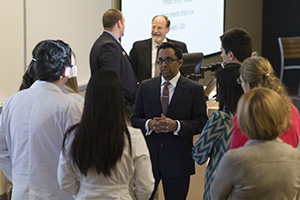 Throughout his energetic presentation, Dr. Fernandes referenced there is a Materialist Model in today’s culture with an implication that when a patient suffers, he/she should decide what’s next, be it death or life. According to him, the model alludes that religion has become a curious funny hat and when you want to, you can take it off. “If it [religion] helps through illness, that’s great, but if it causes you to not do an abortion, take it off. When you wear a white coat, leave your religion at home. Students, do not buy into that. If you are a person of faith – hold onto it. Remember that loving people in the abstract is easy, but person loving is hard. This is where your commitment comes in. Love wins through what you believe is morally true.”
Throughout his energetic presentation, Dr. Fernandes referenced there is a Materialist Model in today’s culture with an implication that when a patient suffers, he/she should decide what’s next, be it death or life. According to him, the model alludes that religion has become a curious funny hat and when you want to, you can take it off. “If it [religion] helps through illness, that’s great, but if it causes you to not do an abortion, take it off. When you wear a white coat, leave your religion at home. Students, do not buy into that. If you are a person of faith – hold onto it. Remember that loving people in the abstract is easy, but person loving is hard. This is where your commitment comes in. Love wins through what you believe is morally true.”
“Your job, as a physician, is to do what’s in the best interest of the patient, even if it’s not what the patient wants. No professional body should say, ‘You must do this, or you’re not a good physician.’ This is a lie.,” Dr. Fernandes added. “Think of it this way…if you had a physician, what kind of doctor do you really want for yourself? One that simply gives you what you want or considers it and might suggest something to improve your state of health overall?”
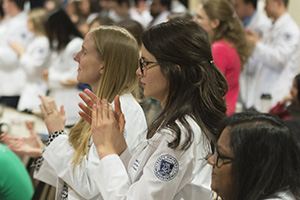 In his closing remarks, Dr. Fernandes challenged the students to not give up. “Don’t give up on your faith to any professional body. Get your Christian on. We need you if we are going to change the culture. All of us need to practice Christian love and be the anvil for Christ. Use the gifts He gave you – now – and become who you ought to be.”
In his closing remarks, Dr. Fernandes challenged the students to not give up. “Don’t give up on your faith to any professional body. Get your Christian on. We need you if we are going to change the culture. All of us need to practice Christian love and be the anvil for Christ. Use the gifts He gave you – now – and become who you ought to be.”
Dr. Fernandes was offered a standing ovation.
The second speaker of the symposium featured Jeffrey C. Tuomala, J.D., LL.M, professor of Law at Liberty University School of Law. Through his presentation The Freedom of Conscience and Medical Ethics, his goal was to encourage students to recognize the distinction between religion and civil government and that conscious has free reign in the realm of religion.
“Often religion is not defined clearly in the legal writings; amendments, constitution, the state level. The Virginia Declaration of Rights objectively defines it as the duty to our Creator,” said Prof. Tuomala. “Think in these terms: two jurisdictions under God; civil government (force or violence) and religion (reason and conviction). God reveals Himself in our conscience and His written word. His revelation is the same, though we often misinterpret it, and we need the council of others, the church and its testimony.”
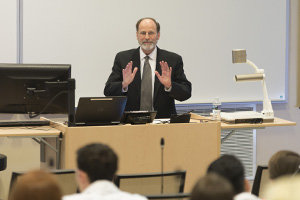 Prof. Tuomala offered five key points during his presentation: 1) God defines the duties we owe exclusively to Him, 2) religion is objectively defined, 3) the freedom of conscience operates within the jurisdiction of religion, 4) duties to God are rights with regard to others, and 5) we have freedom of conscience because God commands it. “Where we all go wrong is by drawing a false distinction between religion and secular, placing matters in the jurisdiction of civil government that belong in the jurisdiction of religion, and distorting justice regarding those matters that are properly within the jurisdiction of civil government,” he said.
Prof. Tuomala offered five key points during his presentation: 1) God defines the duties we owe exclusively to Him, 2) religion is objectively defined, 3) the freedom of conscience operates within the jurisdiction of religion, 4) duties to God are rights with regard to others, and 5) we have freedom of conscience because God commands it. “Where we all go wrong is by drawing a false distinction between religion and secular, placing matters in the jurisdiction of civil government that belong in the jurisdiction of religion, and distorting justice regarding those matters that are properly within the jurisdiction of civil government,” he said.
Comically concluding his presentation, Prof. Tuomala offered his version of Bumper Sticker Jurisprudence, “Know the First Commandment, Know the First Amendment. No First Commandment, No First Amendment.”
The final message Right of Conscience in Mental Health: A Christian Perspective came from Linda S. Mintle, PhD, director of Strategic Development for Clinical Affairs, and chair of the Division of Behavioral Health, at Liberty University College of Osteopathic Medicine. Referencing her 25-plus years of study and practice in mental health, she emphasized she is no stranger to bioethical issues. “I have to be aware of legal issues and cultural movements that affect practice. Our fundamental right [conscience], framed in the constitution, has roots in the spiritual founding of our nation. It is challenged under the guise of discrimination, claiming anyone who has a moral belief that differs from the cultural narrative advocated by powerful special interest groups is harming people.”
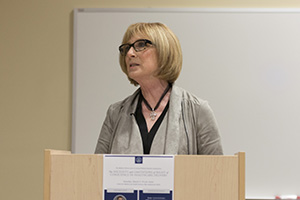 Dr. Mintle emphasized that LUCOM is at an advantage by way of presenting a symposium on the right of conscience. “You will not hear many universities talking about these positions as they are controlled by a small elite,” she said. “I would argue that when someone holds to a right of conscience argument, they do have the welfare of patients in mind, because they fundamentally believe they would do harm if pressed to behave or speak in a way inconsistent with the moral law to which they hold. But ‘client welfare’ is a subjective term, determined by emotional reasoning and ideology, not data.”
Dr. Mintle emphasized that LUCOM is at an advantage by way of presenting a symposium on the right of conscience. “You will not hear many universities talking about these positions as they are controlled by a small elite,” she said. “I would argue that when someone holds to a right of conscience argument, they do have the welfare of patients in mind, because they fundamentally believe they would do harm if pressed to behave or speak in a way inconsistent with the moral law to which they hold. But ‘client welfare’ is a subjective term, determined by emotional reasoning and ideology, not data.”
To add to her view, she was pleased that on Jan. 18, 2018, President Trump and his administration created a new Conscience and Religious Freedom Division within the Health and Human Services Department. “This is an important step to allow doctors and mental health providers to abstain from procedures and treatments that go against their moral conscience.”
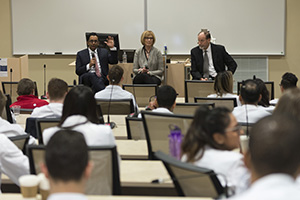 Concluding her presentation, Dr. Mintle asked the question, “If the convictions you hold are based on absolute truth, then what possible harm can come from debate that challenges those views?” Encouraging the students to be like a modern-day Daniel, from the Bible, she said, “Christians shouldn’t fear differences of opinions. They are to be armed with apologetics based on the Word of God and stand for truth in a culture that regularly opposes such.”
Concluding her presentation, Dr. Mintle asked the question, “If the convictions you hold are based on absolute truth, then what possible harm can come from debate that challenges those views?” Encouraging the students to be like a modern-day Daniel, from the Bible, she said, “Christians shouldn’t fear differences of opinions. They are to be armed with apologetics based on the Word of God and stand for truth in a culture that regularly opposes such.”
All three speakers were asked to remain for a short-panel discussion.
See a gallery of images from the symposium at Facebook.com/LibertyMedicine.